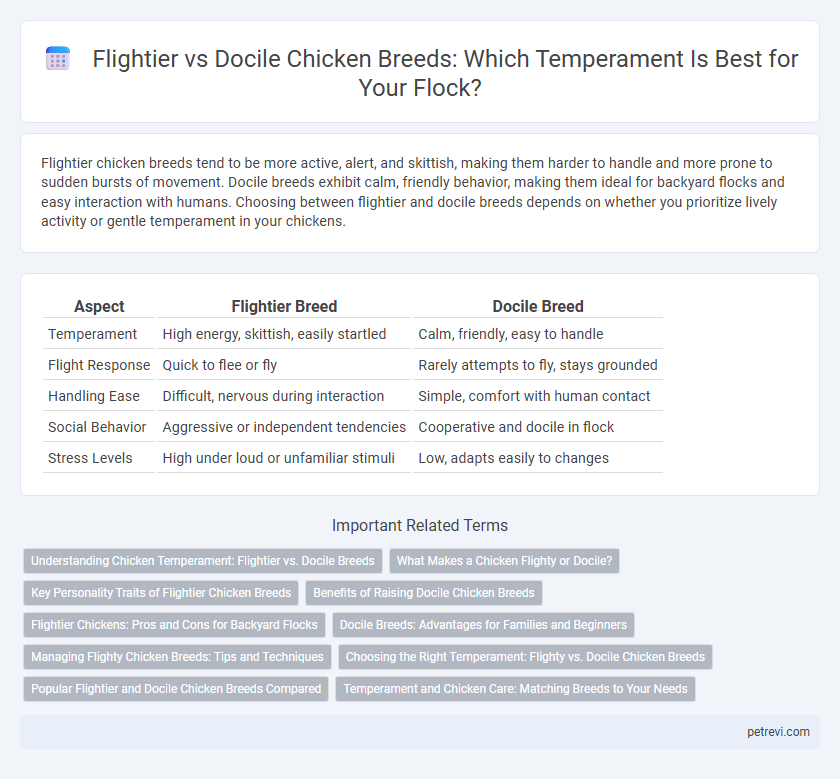Flightier chicken breeds tend to be more active, alert, and skittish, making them harder to handle and more prone to sudden bursts of movement. Docile breeds exhibit calm, friendly behavior, making them ideal for backyard flocks and easy interaction with humans. Choosing between flightier and docile breeds depends on whether you prioritize lively activity or gentle temperament in your chickens.
Table of Comparison
| Aspect | Flightier Breed | Docile Breed |
|---|---|---|
| Temperament | High energy, skittish, easily startled | Calm, friendly, easy to handle |
| Flight Response | Quick to flee or fly | Rarely attempts to fly, stays grounded |
| Handling Ease | Difficult, nervous during interaction | Simple, comfort with human contact |
| Social Behavior | Aggressive or independent tendencies | Cooperative and docile in flock |
| Stress Levels | High under loud or unfamiliar stimuli | Low, adapts easily to changes |
Understanding Chicken Temperament: Flightier vs. Docile Breeds
Flightier chicken breeds exhibit high alertness and rapid movement, making them more prone to stress and harder to handle, while docile breeds are calmer and more social, ideal for backyard flocks and beginner keepers. Understanding these temperament traits helps poultry farmers choose breeds suited to their management style and environment, optimizing flock harmony and productivity. Selecting docile breeds like Silkies or Orpingtons can reduce aggression and ease coop maintenance compared to flightier breeds such as Leghorns.
What Makes a Chicken Flighty or Docile?
Flightier chicken breeds such as Leghorns and Anconas exhibit heightened alertness and rapid movements due to their strong instinct to escape predators, influenced by genetics and early handling experiences. Docile breeds like Orpingtons and Plymouth Rocks display calmer behavior, often resulting from selective breeding for tameness and frequent positive human interaction. Factors influencing temperament include breed genetics, socialization during chick development, and environmental stimuli affecting stress responses.
Key Personality Traits of Flightier Chicken Breeds
Flightier chicken breeds exhibit high alertness, strong instincts for evading predators, and greater nervous energy, making them less handling-friendly compared to docile breeds. These breeds often display increased agility, rapid movements, and a tendency to quickly take flight when startled. Their temperaments require careful management to minimize stress and ensure secure confinement in free-range or backyard settings.
Benefits of Raising Docile Chicken Breeds
Docile chicken breeds, such as Orpingtons and Cochins, offer significant advantages for backyard poultry keepers by exhibiting calm and friendly temperaments that simplify handling and reduce stress in social flock environments. These breeds typically adapt well to confinement and human interaction, promoting safer management for families and beginners. Their gentle nature also results in lower aggression-related injuries, enhancing overall flock health and productivity.
Flightier Chickens: Pros and Cons for Backyard Flocks
Flightier chicken breeds, such as Leghorns and Polish, exhibit high energy and alertness, making them excellent for free-range backyard flocks seeking natural foraging behaviors. Their strong flight instincts often cause them to roost out of reach, offering some protection from ground predators but complicating capture and handling. However, flightier chickens can be more prone to stress and injury in confined spaces, requiring secure fencing and ample room to thrive.
Docile Breeds: Advantages for Families and Beginners
Docile chicken breeds, such as Buff Orpingtons and Silkies, are ideal for families and beginners due to their calm temperament and ease of handling. These breeds are less likely to exhibit aggressive behaviors, making them safer and more enjoyable around children. Their friendly nature promotes regular interaction, simplifying care and encouraging a positive backyard poultry experience.
Managing Flighty Chicken Breeds: Tips and Techniques
Flightier chicken breeds, such as Leghorns, require careful management to reduce stress and injury risks. Providing ample space, secure fencing, and consistent handling helps calm their nervous disposition, while offering elevated perches satisfies their natural flight tendencies. Regular interaction and environmental enrichment encourage trust, making flighty chickens easier to manage compared to docile breeds like Orpingtons.
Choosing the Right Temperament: Flighty vs. Docile Chicken Breeds
Flightier chicken breeds, such as Leghorns, exhibit high energy and alertness, making them more prone to quick movements and flightiness, ideal for free-range environments where predators are minimal. Docile breeds like Orpingtons are calmer and easier to handle, suitable for backyard flocks or families with children due to their gentle nature. Selecting the right temperament depends on your management style, space, and interaction frequency, with flighty breeds requiring more patience and secure enclosures while docile breeds adapt well to close human contact and confinement.
Popular Flightier and Docile Chicken Breeds Compared
Susceptible to flight, flightier chicken breeds like Leghorns and Anconas display high energy and alertness, making them excellent foragers but challenging to handle in backyard settings. In contrast, docile breeds such as Silkies and Orpingtons exhibit calm temperaments and friendly behavior, ideal for families and novice chicken keepers seeking easy management. Understanding these temperament differences aids poultry enthusiasts in selecting the appropriate breed for their environment and interaction preferences.
Temperament and Chicken Care: Matching Breeds to Your Needs
Flightier chicken breeds exhibit high energy levels and strong instinct to roam, requiring secure, spacious enclosures to prevent escape and stress. Docile breeds tend to be calmer and more sociable, making them easier to handle and ideal for backyard settings or families with children. Selecting a breed with temperament suited to your care capabilities ensures better welfare, easier management, and a harmonious environment for both chickens and owners.
Flightier breed vs Docile breed for Chicken Temperament Infographic

 petrevi.com
petrevi.com